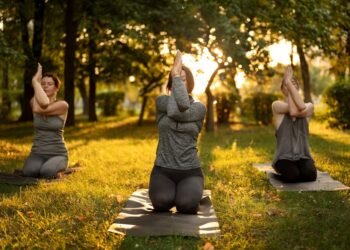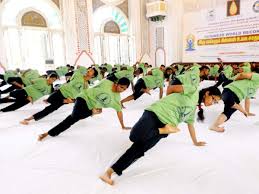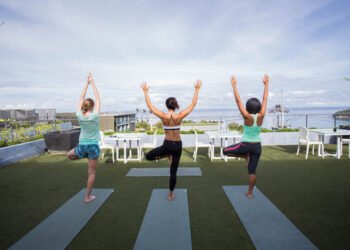Timeless Wisdom: Unveiling the Fountain of Youth through Yoga for Longevity
Yoga, an ancient practice that originated in India, has gained immense popularity worldwide for its numerous benefits to the body, mind, and spirit. Unlike conventional exercise routines, yoga encompasses a holistic approach towards achieving overall well-being.
It integrates physical postures (asanas), breath control (pranayama), meditation (dhyana), and ethical principles (yamas and niyamas) to create a harmonious connection between the body and the mind.
The Holistic Practice for Physical, Mental, and Spiritual Well-being
Yoga is not limited to merely physical exercise; it serves as a comprehensive system that nurtures all aspects of our being. Through the practice of asanas, individuals can improve their strength, flexibility, balance, and posture.
When accompanied by pranayama techniques that regulate breathing patterns and enhance energy flow throughout the body, yoga promotes optimal physical health. Moving beyond the physical realm, yoga provides immense mental well-being advantages.
The integration of meditative practices encourages mindfulness and self-awareness while reducing stress levels. Moreover, through regular yogic practice combined with meditation techniques such as dhyana or focused concentration on specific objects or mantras, individuals can attain mental clarity and emotional stability.
The Importance of Longevity in Today’s Fast-paced World
In today’s fast-paced society, filled with constant demands and pressures from various sources such as work deadlines or personal responsibilities, prioritizing longevity has become increasingly crucial. Longevity refers to not only extending one’s lifespan but also ensuring a high quality of life throughout those extended years.
As advancements in healthcare have increased life expectancy rates globally, it has become essential for individuals to focus on maintaining optimal health physically, mentally, and spiritually.
By incorporating practices like yoga into our lives consciously, we can enhance our physical fitness, mental resilience, and emotional well-being, thus promoting longevity and ensuring a fulfilling existence as we age.
Through the exploration of yoga’s holistic approach towards well-being and an understanding of the significance of longevity in our fast-paced world, we can delve into the various benefits of yoga that contribute to overall health and longevity.
In the following sections, we will explore the scientific evidence supporting yoga’s positive effects on physical health markers, its influence on mental well-being, and its spiritual dimension that facilitates personal growth.
Understanding LongevityThe Art of Aging Gracefully: Exploring the Magic of Longevity
Longevity, defined as the ability to live a long and prosperous life, has always been an intriguing concept for humanity. It encompasses not only the length of our years but also the quality of our existence.
Research shows that longevity is closely linked to our overall health and well-being, making it a subject worthy of exploration.
The definition of longevity and its Relationship to health and quality of Life Fountain of Youth: The Nexus Between Longevity and Health
To understand longevity better, we must first define it as far more than just adding years to one’s life. Longevity encompasses physical vitality, mental acuity, emotional resilience, and spiritual contentment—all crucial aspects that contribute to a fulfilling existence.
It goes beyond mere survival; it seeks to enhance the experience of life itself. Achieving longevity involves maintaining optimal health in all dimensions—physically, mentally, emotionally, and spiritually.
For instance, physical well-being plays a vital role in increasing longevity. Healthy habits such as regular exercise, nutritious diet choices, adequate sleep patterns, and stress management techniques have been proven to promote robust health throughout one’s lifespan.
Discussion on the factors that contribute to longevityLifespan Secrets Unveiled: Factors Influencing Our Journey Towards Longevity
While genetics certainly play a significant role in determining an individual’s potential for a long life span, studies have shown that lifestyle choices and environmental factors can also significantly impact longevity.
Lifestyle choices such as maintaining a balanced diet rich in whole foods while minimizing processed foods can provide essential nutrients that support overall health.
Regular physical activity, including practices like yoga, can boost cardiovascular health, increase flexibility and strength, and improve longevity indicators. Additionally, social connections and strong support networks have been linked to increased longevity.
Engaging in meaningful relationships, being part of a community, and nurturing emotional well-being can contribute to a longer and more fulfilling life. Environmental factors also influence longevity.
Access to clean air and water, exposure to nature, and living in a safe environment contribute to overall well-being. Creating a conducive environment that promotes health is essential for maximizing one’s potential for longevity.
The Science Behind Yoga’s Benefits for Longevity
Exploration of Scientific Studies on Physical Health Markers
Scientific research has provided compelling evidence supporting the positive effects of yoga on various physical health markers, ultimately contributing to longevity. Numerous studies have demonstrated that regular yoga practice can lead to significant improvements in blood pressure, heart rate variability, and immune function.
For instance, a study published in the Journal of Alternative and Complementary Medicine found that individuals who practised yoga for at least 12 weeks experienced a noticeable decrease in systolic and diastolic blood pressure levels.
Another study conducted by Harvard Medical School revealed that long-term yoga practitioners exhibited greater heart rate variability, indicating a more resilient cardiovascular system.
Moreover, research published in the Journal of Behavioral Medicine demonstrated that yoga practitioners had enhanced immune function markers such as increased natural killer cell activity and antibody response.
These findings highlight how incorporating yoga into one’s routine can positively impact key physical health indicators associated with longevity.
Explanation of Yoga’s Stress-Reducing Mechanisms
One significant factor contributing to the link between regular yoga practice and longevity lies in its ability to reduce stress levels. Yoga achieves this by activating the parasympathetic nervous system and regulating cortisol levels – both crucial aspects of managing stress responses effectively.
The parasympathetic nervous system is responsible for promoting relaxation and restoring calmness after stressful events or daily pressures.
By engaging in slow, controlled movements, deep breathing exercises, and meditation practices during yoga sessions, individuals stimulate their parasympathetic nervous system’s functioning.
Consequently, this activation helps counteract the detrimental effects of chronic stress on physiological systems by promoting restorative processes such as lowered heart rate and blood pressure levels. Moreover, cortisol regulation plays an important role in managing stress-related health issues effectively.
Elevated cortisol levels over prolonged periods can lead to various negative health outcomes, such as impaired immune function, increased abdominal fat deposition, and heightened inflammation in the body.
Yoga’s ability to regulate cortisol levels has been demonstrated in studies examining the effects of yoga on stress reduction.
For example, a study published in the International Journal of Psychophysiology found that regular yoga practice resulted in significantly lower cortisol levels compared to non-yoga practitioners, even during challenging situations.
This suggests that incorporating yoga into one’s routine can help combat the negative impact of stress on overall health and contribute to a longer and healthier life.
By exploring scientific studies on physical health markers and explaining how yoga reduces stress by activating the parasympathetic nervous system and regulating cortisol levels, we gain insight into the scientific foundation behind yoga’s benefits for longevity.
These findings underscore the importance of including regular yoga practice as part of a holistic approach towards enhancing one’s overall well-being and promoting longevity.
Physical Benefits of Yoga for Longevity
A Path to Age Gracefully and Vibrantly
Regular yoga practice offers a myriad of physical benefits that contribute to longevity and healthy ageing. One notable advantage involves enhancing flexibility, which becomes increasingly essential as we age.
Yoga’s gentle stretching and range-of-motion exercises help maintain joint mobility, preventing stiffness and reducing the risk of injury caused by limited range of motion. Moreover, increased flexibility promotes ease in daily activities such as bending down, reaching overhead, or turning the neck.
In addition to flexibility, yoga improves strength by engaging various muscle groups throughout the body. While it may not involve heavy weights or intense resistance training, yoga postures require holding poses that uniquely challenge muscles.
These sustained holds build functional strength that aids in maintaining proper posture, supporting the spine, and preventing muscular imbalances. Yoga also plays a crucial role in cultivating balance—a fundamental aspect of graceful ageing.
As we age, our balance naturally declines, making us more susceptible to falls and injuries. By practising balance-oriented poses like Tree Pose (Vrikshasana), Warrior III (Virabhadrasana III), or Half-Moon Pose (Ardha Chandrasana), individuals can improve their proprioception and core stability while reducing the risk of falls.
Another key area for healthy ageing is posture maintenance. Poor posture can lead to back pain, reduced lung capacity, digestive issues, and lack of confidence.
Regular yoga practice helps correct postural imbalances caused by sedentary lifestyles or improper body mechanics. Poses like Cat-Cow (Marjaryasana-Bitilasana) or Cobra Pose (Bhujangasana) strengthen the muscles supporting the spine while opening up the chest and shoulders for an upright posture.
Targeted Yoga Poses for Healthy Aging
To address age-related issues specifically, certain yoga poses can be incorporated into a regular practice. For joint stiffness, gentle movements like Supine Knee Sway (Supta Ardha Matsyendrasana) or Seated Neck Release (Gomukhasana Variation) help increase joint mobility and relieve discomfort.
To prevent osteoporosis and maintain bone health, weight-bearing poses like Warrior II (Virabhadrasana II), Triangle Pose (Trikonasana), or Bridge Pose (Setu Bandha Sarvangasana) stimulate bone remodelling and strengthen the skeletal system.
Building a strong core is vital for overall stability and maintaining proper posture throughout life. Poses such as Plank (Phalakasana), Boat Pose (Navasana), or Side Plank (Vasisthasana) effectively engage the abdominal muscles to improve core strength.
By incorporating these targeted yoga poses into a regular practice, individuals can experience profound physical benefits that contribute to healthy ageing and longevity. Remember that consistency is key; gradually progress in difficulty while honouring your body’s limitations to enjoy optimal results over time.
Mental Benefits of Yoga for Longevity
Enhancing Cognitive Function: Focus, Memory Retention, and Mental Clarity
Yoga is not only beneficial for physical health but also holds immense potential for improving cognitive function. Regular practice can enhance focus, memory retention, and mental clarity, allowing individuals to maintain their cognitive abilities as they age gracefully.
During a yoga session, practitioners are encouraged to concentrate on their breath and the present moment.
This focused attention cultivates mindfulness and trains the mind to stay present rather than being distracted by wandering thoughts. As a result, yoga helps improve concentration and enhances the ability to stay focused on tasks at hand.
Moreover, physical movement combined with mindful breathing increases blood flow to the brain, supplying it with oxygen-rich blood that supports optimal brain function. Over time, this cognitive stimulation can lead to better memory retention and improved mental clarity.
The Role of Mindfulness in Reducing Anxiety and Depression
Anxiety and depression are common obstacles that can hinder an individual’s journey towards longevity by contributing to chronic stress and negatively impacting overall well-being.
Fortunately, yoga offers a powerful tool in the form of mindfulness practice that can help combat these challenges. Mindfulness involves grounding oneself in the present moment without judgment or attachment to thoughts or emotions.
Through intentional breathwork, meditation techniques, and bodily awareness during yoga practice, individuals develop an enhanced ability to recognize negative thoughts or emotional patterns that contribute to anxiety or depression.
By cultivating non-reactive awareness towards these mental states during yoga sessions, practitioners gain valuable tools outside of their practice as well – allowing them to apply mindfulness techniques in their daily lives when faced with stressors or challenging situations.
Scientific studies have demonstrated that regular mindfulness practices like those found in yoga can reduce anxiety levels by calming the mind and promoting relaxation responses within the body.
Additionally, cultivating mindful awareness fosters self-compassion and self-acceptance, reducing feelings of depression and promoting a positive mindset that supports longevity.
Spiritual Benefits of Yoga for Longevity
Finding Purpose and Meaning Through Yoga
Yoga is not only a physical practice but also a deeply spiritual one. Through regular yoga practice, individuals can cultivate a profound sense of purpose and meaning in life. By connecting with their inner selves, they embark on a journey of self-discovery that goes beyond the physical realm.
Yoga encourages individuals to explore their values, beliefs, and desires, allowing them to align their actions with their true purpose. As they deepen their connection with themselves through breathwork, movement, and mindfulness, practitioners often experience a heightened sense of clarity and fulfilment.
Meditation Practices for Self-Reflection and Personal Growth
Meditation is an integral part of yoga that facilitates self-reflection and personal growth. It provides an opportunity to quiet the mind, observe thoughts without judgment, and delve into the depths of consciousness.
Within the realm of meditation practices in yoga, various techniques like mantra repetition (japa), focused attention (Dharana), or transcendental meditation (TM) can be explored.
These practices encourage individuals to detach from external distractions and connect with their inner wisdom. Regular meditation promotes emotional resilience, enhances self-awareness, reduces stress levels, and fosters personal growth by promoting introspection and self-reflection.
Tailoring Yoga Practice for Longevity
Tips on Selecting Appropriate Styles
When selecting a style of yoga for longevity purposes, it’s essential to consider individual needs and physical capabilities. Gentle or restorative yoga styles are ideal for beginners or those seeking relaxation while still reaping the benefits of yoga practice.
These styles prioritize slow movements combined with deep stretching to improve joint mobility and flexibility gently.
For individuals desiring more energetic practices that boost cardiovascular health alongside longevity benefits, styles like Vinyasa or Ashtanga can be suitable options. It is crucial to listen to one’s body and choose a style that aligns with personal preferences and goals.
Conclusion
As we conclude this exploration of the spiritual benefits of yoga for longevity and the importance of tailoring one’s practice, it becomes evident that yoga encompasses much more than physical exercise.
By regularly engaging in yoga, individuals can tap into their inner selves, finding purpose, meaning, and connection. The practice of meditation within yoga further enhances self-reflection and personal growth.
By selecting appropriate styles and practices that suit individual needs, individuals embark on a journey towards long-lasting health and well-being.
Embracing yoga as a holistic approach to longevity empowers individuals to nurture their physical, mental, and spiritual dimensions in harmony, ultimately leading to a life filled with vitality and fulfilment.










